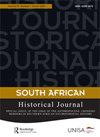对帝国边缘体育文化的批判性思考
IF 1
3区 历史学
Q1 HISTORY
引用次数: 0
摘要
了解这种转变是如何发生的以及为什么发生的,以及这些女性面临并将继续面临的挑战,都很有启发性。马利赫的书填补了莱索托史学的一个空白,讲述了莱索托从莫斯科到现在的历史。吉尔1993年的调查是一本在莱索托以外很难找到的书,自那以来,还没有历史学家尝试过这样的壮举,马利赫的成功值得称赞。但不仅仅是莱索托的专家应该阅读这本书,因为它对政治和经济之间联系的探索在21世纪的南部非洲有着跨越国界的经验教训。这本书,尤其是最后几章,是对殖民统治不公正的谴责,也是对独立以来政治阶层经济管理不善的谴责。Maliehe在谈到僵化的国家边界和似乎只对政治家和高级官僚有利的政策时指出,“僵化的国家身份建构主要为统治者服务,而不是为那些继续努力突破限制其自决权的力量的大多数人服务”(161)。《商业政治》讲述了巴索托人与外国在商业中的各种统治进行斗争的长期故事,它不仅指出了政治决策剥夺了大多数人的权利,还指出了基层努力、大规模动员和流动资金的潜力,以帮助巴索托个人和整个莱索托创造更美好的未来。本文章由计算机程序翻译,如有差异,请以英文原文为准。
Critical Reflections on Physical Culture at the Edges of Empire
instructive to hear how and why this transition happened, and what challenges these women faced and continue to face. Maliehe’s book fills a lacuna in Lesotho’s historiography by providing a narration of Lesotho’s history fromMoshoeshoe to the present. Not since Gill’s 1993 survey, which is a difficult book to find outside Lesotho, has a historian attempted such a feat, and Maliehe is to be commended for succeeding admirably. But it is not just Lesotho specialists who should read this book, as its exploration of the linkages between politics and economics has lessons that cut across national boundaries in twenty-first-century southern Africa. The book, especially the last few chapters, is a damning indictment of the injustices of colonial rule, but also of the economic mismanagement of the political classes since independence. Writing about rigid national boundaries and policies that seem to benefit only politicians and senior bureaucrats, Maliehe notes that ‘rigid constructions of national identity work mostly for the rulers, not the majority who continue to struggle to break through forces confining their self-determination’ (161). Setting the long-term story of the Basotho struggle against a variety of foreign dominations in commerce, Politics as Commerce not only points out where political decisions have disenfranchised the majority, but also points to the potential for grassroots efforts, mass mobilisation, and mobile money to help make a better future for Basotho individuals and Lesotho as a whole.
求助全文
通过发布文献求助,成功后即可免费获取论文全文。
去求助
来源期刊

South African Historical Journal
Multiple-
CiteScore
0.70
自引率
0.00%
发文量
37
期刊介绍:
Over the past 40 years, the South African Historical Journal has become renowned and internationally regarded as a premier history journal published in South Africa, promoting significant historical scholarship on the country as well as the southern African region. The journal, which is linked to the Southern African Historical Society, has provided a high-quality medium for original thinking about South African history and has thus shaped - and continues to contribute towards defining - the historiography of the region.
 求助内容:
求助内容: 应助结果提醒方式:
应助结果提醒方式:


